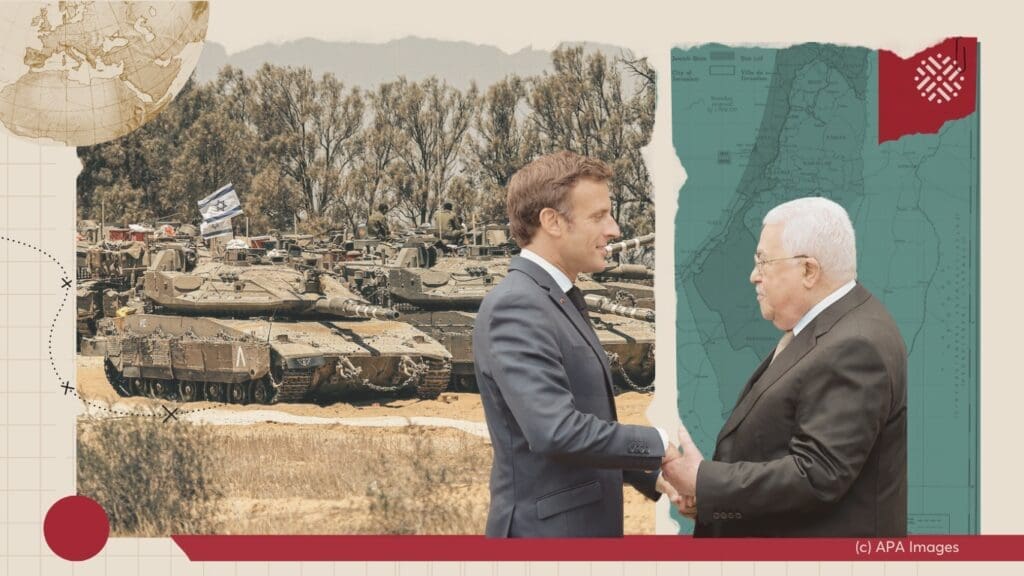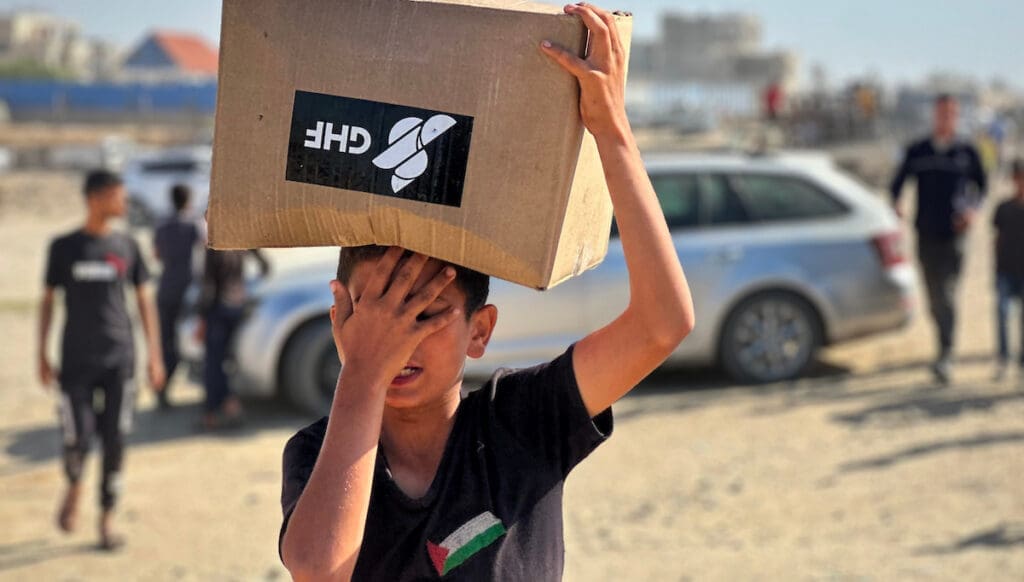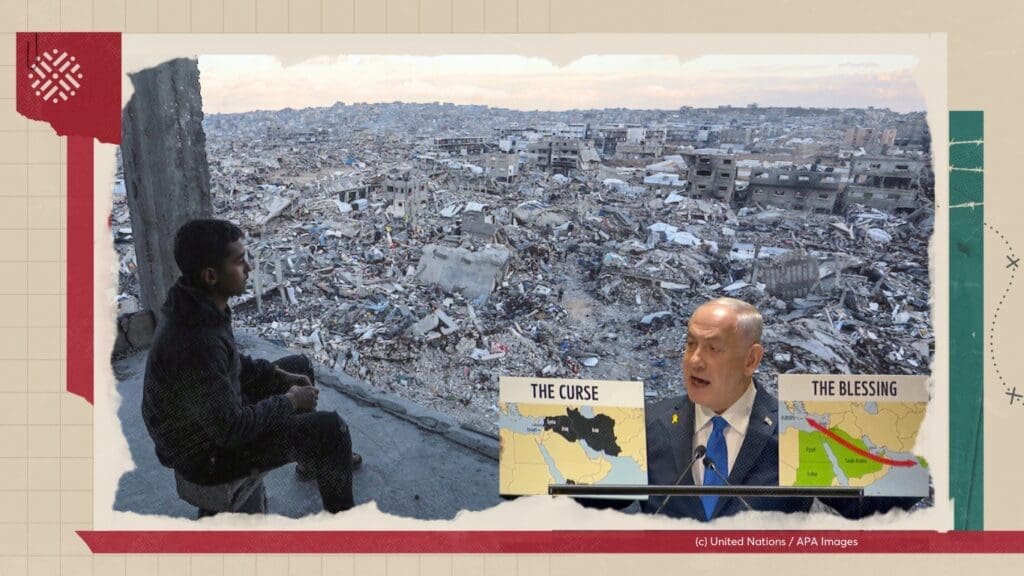- Topics
-
Topics
See our analysis on civil society and how it shapes culture, politics, and policies
Read our insights on the shifting political landscape and what it means for Palestine
Learn more about the policies and practices shaping the Palestinian economy
Strengthen your understanding of the unique conditions for Palestinian refugees across the Middle East
-
- Analysis
-
Analysis
In-depth analysis on existing or potential policies that impact possibilities for Palestinian liberation.
Insights and perspectives on social, political, and economic questions related to Palestine and Palestinians globally.
Concise analysis into a specific policy, its background and implications.
Commentary that brings together insights from multiple analysts.
Compilations of past Al-Shabaka works surrounding a specific theme.
Longer-form, ad hoc projects that seek to confront research questions outside the scope of our regular analysis.
A policy-driven research initiative by Al-Shabaka: The Palestinian Policy Network.
Our monthly webinar series that brings together Palestinian experts.
Featured
Since October 2023, Israel’s assault on Gaza has produced one of the most catastrophic humanitarian crises in recent history—an unfolding genocide enabled by world powers and continuing unabated despite the sweeping global solidarity it has sparked. Alongside relentless bombardment and mass displacement, the Israeli regime is waging a deliberate campaign of starvation. In response to this Israeli-manufactured catastrophe, several European states have begun recognizing or signaling their intent to recognize the State of Palestine. Most recently, France announced its intention to recognize a Palestinian state at the UN General Assembly in September. The UK has stated it will follow suit unless Israel abides by a ceasefire and recommits to a two-state solution. The recent wave of symbolic recognitions that began in 2024 now appears to be the only step many European powers are willing to take in the face of genocide, following nearly two years of moral, material, and diplomatic support for the Israeli regime as well as near-total impunity. This roundtable conversation with Al Shabaka policy analysts Diana Buttu, Inès Abdel Razek, and Al Shabaka’s co-director, Yara Hawari, asks: Why now? What political or strategic interests are driving this wave of recognition? And what does it mean to recognize a Palestinian state, on paper, while leaving intact the structures of occupation, apartheid, and the genocidal regime that sustains them?

 In March, Israel shattered the ceasefire in Gaza by resuming its bombing campaign at full force and enforcing a total blockade on humanitarian aid—ushering in a new phase of the ongoing genocide. In response to mounting international criticism, the Israeli regime introduced a tightly controlled aid scheme designed not to alleviate suffering, but to obscure its use of starvation as a weapon of collective punishment. Through the so-called Gaza Humanitarian Foundation (GHF), Israel has transformed humanitarian aid into a tool of control, coercion, and forced displacement. Israeli forces have additionally blocked UN and other aid agencies from accessing over 400 distribution points they once operated throughout Gaza. They consequently forced two million Palestinians to rely on just four GHF sites, most near its southern border in what appears to be a deliberate effort to push mass displacement toward Egypt. Investigations have also revealed how US-based private contractors are actively profiting from the GHF’s deadly operations. In this policy lab, Yara Asi and Alex Feagans join host Tariq Kenney-Shawa to discuss how the GHF fits into Israel’s genocidal strategy—and to expose the network of individuals and companies profiting from what has been a death trap masquerading as humanitarian assistance.
In March, Israel shattered the ceasefire in Gaza by resuming its bombing campaign at full force and enforcing a total blockade on humanitarian aid—ushering in a new phase of the ongoing genocide. In response to mounting international criticism, the Israeli regime introduced a tightly controlled aid scheme designed not to alleviate suffering, but to obscure its use of starvation as a weapon of collective punishment. Through the so-called Gaza Humanitarian Foundation (GHF), Israel has transformed humanitarian aid into a tool of control, coercion, and forced displacement. Israeli forces have additionally blocked UN and other aid agencies from accessing over 400 distribution points they once operated throughout Gaza. They consequently forced two million Palestinians to rely on just four GHF sites, most near its southern border in what appears to be a deliberate effort to push mass displacement toward Egypt. Investigations have also revealed how US-based private contractors are actively profiting from the GHF’s deadly operations. In this policy lab, Yara Asi and Alex Feagans join host Tariq Kenney-Shawa to discuss how the GHF fits into Israel’s genocidal strategy—and to expose the network of individuals and companies profiting from what has been a death trap masquerading as humanitarian assistance.
 The October 7, 2023, Al-Aqsa Flood operation aimed to revive Palestinian armed resistance and reassert the cause in Arab and global consciousness after years of marginalization. It dealt a major blow to Israel’s deterrence, rupturing its image as a secure colonial outpost entrusted with protecting Western strategic interests. It also exposed cracks in its militarized social contract that rests on the regime’s ability to protect its settler population. While the operation imposed new political realities on the Israeli regime, it has come at a staggering cost to Palestinian life: Israel’s genocidal assault on Gaza has unleashed one of the worst humanitarian crises in recent memory. Yet the anticipated wave of Arab solidarity following the operation failed to materialize or translate into concrete policy shifts. Instead, the moment laid bare the entrenched ties between Arab regimes and Israel’s settler-colonial project that are rooted in mutual interests, regime preservation, and a shared antagonism toward Palestinian resistance. This commentary argues that these alliances—sustained by repression and strategic-economic cooperation and reinforced by Western complicity—transformed a potential turning point for isolating the Israeli regime into an opening for intensified colonial expansion and regional dominance.
The October 7, 2023, Al-Aqsa Flood operation aimed to revive Palestinian armed resistance and reassert the cause in Arab and global consciousness after years of marginalization. It dealt a major blow to Israel’s deterrence, rupturing its image as a secure colonial outpost entrusted with protecting Western strategic interests. It also exposed cracks in its militarized social contract that rests on the regime’s ability to protect its settler population. While the operation imposed new political realities on the Israeli regime, it has come at a staggering cost to Palestinian life: Israel’s genocidal assault on Gaza has unleashed one of the worst humanitarian crises in recent memory. Yet the anticipated wave of Arab solidarity following the operation failed to materialize or translate into concrete policy shifts. Instead, the moment laid bare the entrenched ties between Arab regimes and Israel’s settler-colonial project that are rooted in mutual interests, regime preservation, and a shared antagonism toward Palestinian resistance. This commentary argues that these alliances—sustained by repression and strategic-economic cooperation and reinforced by Western complicity—transformed a potential turning point for isolating the Israeli regime into an opening for intensified colonial expansion and regional dominance. Tariq Dana· Jul 22, 2025
Tariq Dana· Jul 22, 2025
-
- Resources
- Media & Outreach
- The Network




Unmasking “Aid” After the Palestine Papers
The “Palestine Papers” reveal fully the extent to which Palestinians have neither genuine leadership nor a partner for peace. At the foreground is an unrepresentative “authority” prepared to compromise the most fundamental of Palestinian aspirations for an unrelenting colonizer and its imperious supporter. In the background lies a key mechanism enabling Palestinian deprivation: the aid industry.
Palestinians are among the most aid-subsidized people on earth. Anne Le More’s International Assistance to the Palestinians after Oslo demonstrates how $8 billion of post-Oslo aid made its way to Palestinians between 1994 and 2006. Much of this claimed to build the institutions necessary for a two-state peace process and to support socioeconomic development (see Ali Abunimah’s review “How Aid Hurt Palestine”).
The aid industry is a key factor in Palestinian de-development. Discourses of “aid,” “development,” and “reconstruction” shield Israel’s ongoing occupation and colonial project. A full third of the Palestinian Authority budget is aid-subsidized. In addition to funding a distorted Palestinian political system, the aid industry directly removes from Israel the burden of responsibility for the destruction of Palestinian lives, livelihoods, and infrastructure. In doing so, it allows Israel to focus its resources and efforts to the acceleration of Palestinian poverty, the expansion of settlements, the expropriation of Jerusalem, and the destruction of Gaza (see Al-Shabaka policy brief on Palestinian development).
The blinders through which most aid industry actors operate serve to de-politicize and de-contextualize Palestinian “poverty.” This was evident at a presentation by a representative of a large UN aid agency at a London-based university in late 2010. The presentation outlined a number of initiatives to feed destitute Palestinians and energize the economy of the West Bank, some being replicas of the organization’s work in sub-Saharan Africa and South Asia.
After the presentation, the moderator made clear that the presenter represents an ‘apolitical’ agency and thus would “not field political questions.” Of course, members of the audience could not resist the temptation to ask “political” questions, probing the possibility that de-politicizing aid plays a role in supporting and expediting Palestinian de-development. To this, the presenter posed a troubling dilemma: “Aid saves Palestinian lives.” Surely, it is not enough for aid to “save” Palestinians from their own “poverty,” so that they can continue to endure a devastating occupation and brutal dispossession. Must the choice be starvation on one hand, and on the other, a marginal survival with the dissipation of national aspirations for self-determination and the right of return?
The agency in question is representative of a majority, but not all, of the international aid organizations, agencies, and donor projects servicing Palestinians.
By contrast, two international organizations manage to fulfill significant mandates without de-politicizing their work. The first is the United Relief Works Agency for Palestinian Refugees (UNRWA). Writing on the UNRWA-Palestinian relationship, Randa Farah discusses the way in which the UN agency “is of vital importance to the Palestinian national struggle.” UNRWA upholds its obligation to UN resolutions as a mechanism for maintaining Palestinian refugee visibility and collective memory, and as an organization embodying the mandate for refugee rights in absence of a functioning national Palestinian consensus. Of course, in the absence of a final settlement, UNRWA does play a significant role in supporting the limbo in which millions of Palestinian refugees exist. Yet it operates with full acknowledgment of the political reality and context in which it works, and importantly maintains elements of Palestinian rights and aspirations as part of its core mandate.
Next, the Rosa Luxemburg Foundation (RLF) recognizes that the institutions of foreign aid create dependencies where local organizations are unable to exert and promote their own agendas and aspirations. RLF explicitly acknowledges the decades long failure of the aid industry, and that Palestinian social, economic, and institutional capacity will continue to erode without the support of grassroots and progressive political organizing as well as a Palestinian-owned development agenda.
A large number of Palestinian civil society organizations and individuals embody the aspirations of their people through the peaceful Boycott, Divestment, and Sanctions movement (see the policy brief by Omar Barghouti). Those who support BDS refuse the colonial project of economic normalization and demand a forum through which to express their socioeconomic and political aspirations. In harmony with BDS standards, international aid organizations too must consider the role they -– and their donors –- play in driving Palestinian de-development.
The aid industry in Palestine must choose between either the blind subsidizing of oppression, or a recognition and cessation of its support for it by adopting Mary B. Anderson’s Do No Harm framework, as well as codes of ethics developed by the UN, bilateral donors, and international and national non-governmental organizations. Subsidizing a brutal occupation and illegitimate authority translates into the deliberate crushing of Palestinian aspirations and hence the very tools for creating lasting peace. As the world has witnessed through the “Palestine Papers,” when aid is de-politicized, donors and international organizations are able to pour billions of dollars into a colonial project under the masks of institution building and poverty reduction. Standing in stark opposition to the stated objectives of aid to Palestinians is the reality of subjugation so clearly evoked in Malcolm X’s “Message to the Grassroots”: the façade of a government pandering to an uncompromising colonial project bent on the destruction of Palestinian human rights and national aspirations.
As a first step out of this inadvertent (or intended) collaboration, well-meaning aid workers should embrace the Do No Harm framework within their organizations to ensure that their work does not simply serve to “rebuild” what Israel deliberately destroys. Aid organizations and agencies must seriously rethink the claim that their work is “apolitical,” should immediately publicize the extent of potential harm caused throughout their chain of operations, and outline a transparent action plan for eliminating potential harm in their work. Areas for consideration include: securing funds from donor-countries that support Israeli military or economic activity, objectifying Palestinian ‘poverty’ through literature and marketing materials, working through or with Israeli state agencies, and explicating how aid is employed in relation to Israeli policy and military activity.
Aid agencies must attempt to hold Israel politically, fiscally and morally accountable for past and ongoing destruction rather than contributing to the creation and perpetuation of an illusory Palestinian leadership and Palestinian de-development. Otherwise, massive aid subsidies under the masks of “development,” “reconstruction,” and “institution building” make the aid industry complicit in the deliberate devastation of the people it claims to serve.
Samer Abdelnour
Latest Analysis
Statehood Without Liberation: Europe’s Response to Genocide
The Gaza Humanitarian Foundation: Aid as a Weapon
Normalizing Israeli Impunity and Dominance: The Arab Role
We’re building a network for liberation.
As the only global Palestinian think tank, we’re working hard to respond to rapid developments affecting Palestinians, while remaining committed to shedding light on issues that may otherwise be overlooked.